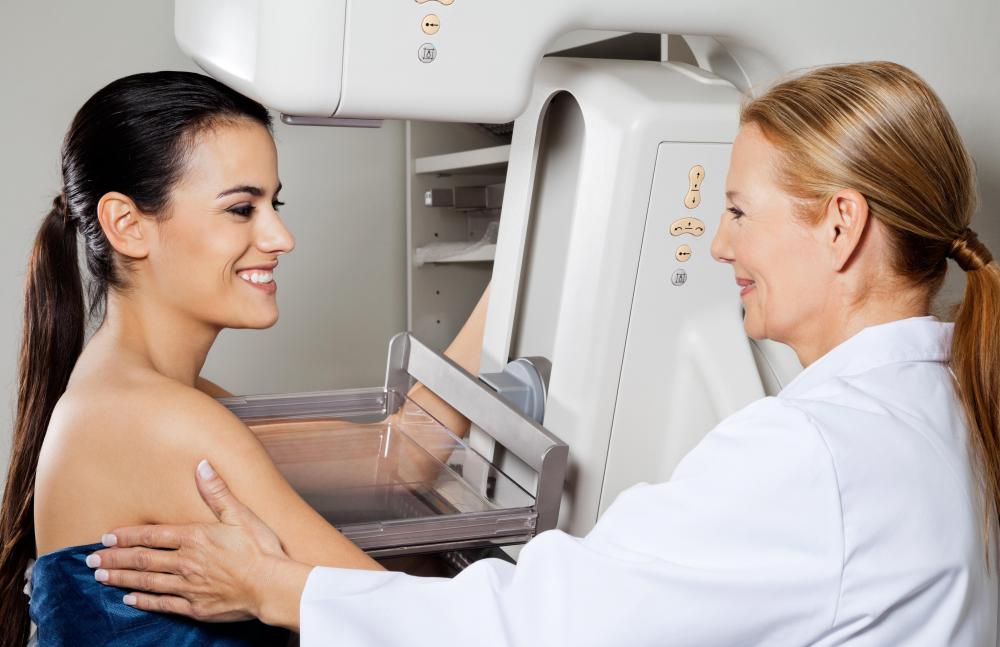At WiseGEEK, we're committed to delivering accurate, trustworthy information. Our expert-authored content is rigorously fact-checked and sourced from credible authorities. Discover how we uphold the highest standards in providing you with reliable knowledge.
What are the Symptoms of Inflammatory Breast Cancer?
Inflammatory breast cancer is an aggressive form of cancer in which the cancer cells clog the lymph vessels in the breast's skin. Inflammatory breast cancer is rare and if often diagnosed in women who are younger on average than those typically diagnosed with non-inflammatory breast cancer. Symptoms typically develop quickly and are varied between patients. Common symptoms of inflammatory breast cancer include breast redness, swelling, burning, aching and a warm feeling in the breast.
This type of cancer develops when one abnormal cell in the breast's ducts mutates to grow and divide rapidly. The rapidly growing abnormal cells block the lymphatic vessels in the skin. This blockage causes red and swollen skin on the breast, which are symptoms of inflammatory breast cancer.

Many people associate a distinct lump in the breast with a symptom of breast cancer. Inflammatory breast cancer differs, because patients typically do not have a lump in the breast. This rare form of aggressive cancer often causes the breast to swell and appear larger. Other symptoms of inflammatory breast cancer might include the nipple appearing inverted. Some patients notice the skin of the breast appears pitted and wrinkled, much like the peel of an orange.

Inflammatory breast cancer can be diagnosed in a number of ways. A breast ultrasound, mammogram or biopsy might be performed to diagnose the presence of inflammatory breast cancer. After cancer has been diagnosed, the stage of cancer will be determined, and a treatment plan will be made available to the patient.
There are two stages of inflammatory breast cancer: stage IIIB and stage IV. Stage IIIB is considered locally advanced cancer. In stage IIIB, the cancer has spread to the connective breast tissue and nearby lymph nodes. In stage IV, the cancer has spread to other areas of the patients body.

Treatment for inflammatory breast cancer usually involves chemotherapy, radiation therapy, biopsy and hormonal therapy. Removal of the breast is often necessary with patients who have inflammatory breast cancer. This type of surgery is called a mastectomy. Hormonal therapy is administered during the last stages of treatment to help prevent the cancer from returning.

Breast infection and inflammation exhibit many of the same symptoms of inflammatory breast cancer. A person who experiences any of the symptoms of inflammatory breast cancer should consult with a physician immediately. Patients who have been diagnosed with inflammatory breast cancer should begin treatment as early as possible because of its rapid growth.
AS FEATURED ON:
AS FEATURED ON:














Discussion Comments
@Scrbblchick -- Wow. That is so sad. Isn't that odd that two people you worked with both had the same kind of rare cancer? That's a little scary.
I can understand your friend not wanting to see a doctor, though. She probably was pretty sure something very, very serious was going on, and had decided to have as much quality of life as possible before she went to see the doc. I get it. I don't know that I'd do it that way, but I get it. Maybe treatment will catch up with the seriousness of the disease and more women can be cured, even of this type of cancer.
I have two former co-workers (and friends) who died from this kind of breast cancer. Both were in their early 40s. One of my friends got treatment early, and even had a stem cell transplant. I think she lived about five years after she was diagnosed.
My other friend knew something was wrong, but wouldn't see a doctor. Finally, her sister made an appointment with her own doctor and that physician said it was cancer as soon as he examined her. He arranged for her to be referred to the big teaching hospital in our area, but the cancer had spread to both breasts, her lymph nodes... Seems like she lived just over a year after she was diagnosed. This is nothing to mess around with.
Post your comments